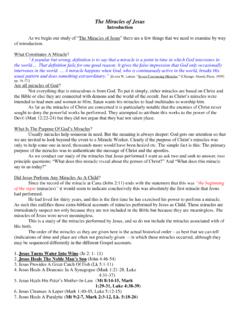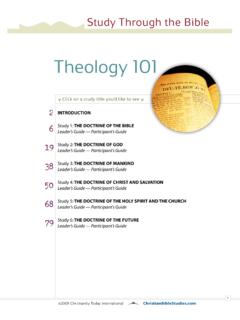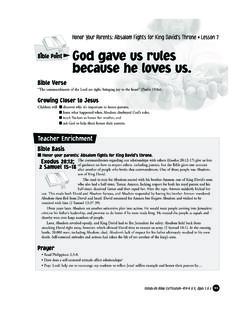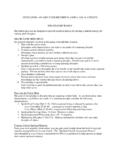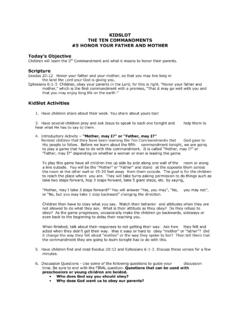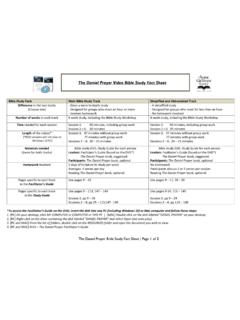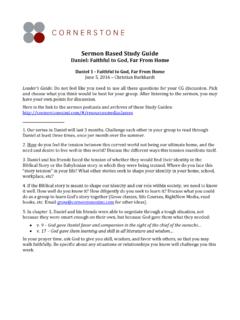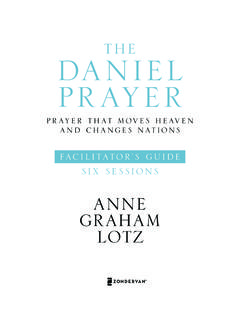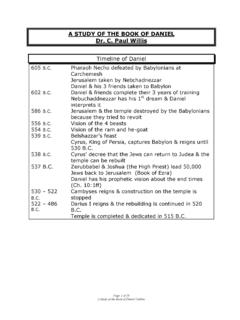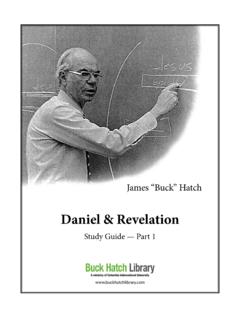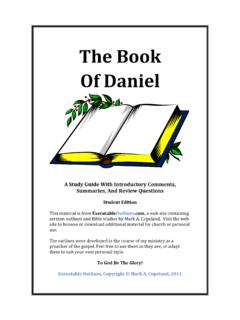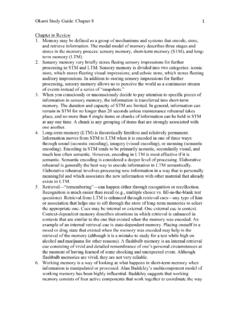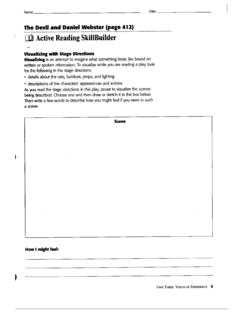Transcription of A Guide to Studying the Book of Daniel - Clover Sites
1 A Guide to Studying the book of Daniel 1 STAND: A Guide to Studying the book of Daniel 2015 A Journey Group Project. This study was written, edited, and tested by members and friends of a Trinity Church Journey Group during the spring of 2015. Their hope was to provide a resource for the Trinity family to use during the 2015 summer sermon series. No Copyright. You are free to use this material as you wish for the glory of God! Note, however, that several sections quote the resources in the appendix. 10101 W. Ann Arbor Rd. Plymouth, MI 48170 734-459-9550 2 Table of Contents PRINCIPLES FOR INTERPRETING SCRIPTURE ..4 INTRODUCTION TO THE CITY OF BABYLON.
2 7 THEMES IN THE book OF Daniel ..7 STRUCTURE OF THE book OF Daniel ..8 OUTLINE OF Daniel ..10 CHAPTER 1 THE PREPARATIONS OF Daniel AND HIS FRIENDS ..11 CHAPTER 2 DREAM OF THE IMAGE OF FOUR CHAPTER 3 STAND UP!..18 CHAPTER 4 THE CONVERSION OF CHAPTER 5 THE WRITING ON THE WALL ..26 CHAPTER 6 THE LION S DEN ..29 CHAPTER 7 A VISION OF COMING KINGDOMS ..33 CHAPTER 8 AN APPALLING VISION ..39 CHAPTER 9:1-19 TEACH ME TO CHAPTER 9:20-27 GOD S RESPONSE THERE IS A BIGGER PICTURE ..46 CHAPTER 10-11:1 GET READY FOR THE LAST VISION ..50 CHAPTER 11:2-12:13 THE MIDDLE EAST FROM Daniel TO THE END ..53 3 APPENDIX RESOURCES FOR FURTHER study ..58 A Deeper Dive into Daniel One thing God asks of us as his disciples is to study His word so we can get to know Him and to see ways we need to grow and mature as believers.
3 The purpose of this material is to supplement the preaching series at Trinity and provide some additional information that you can use to continue to learn throughout the week. Format Except for the Introduction, each section will try to follow a similar format that will focus on these key questions: 1. What does this passage teach? What are the main themes and points Daniel wants you to learn? 2. Why is this important to Daniel ? Is this important to you? 3. What would you like to see change in your relationship with God after you have studied and prayed about this passage? Sources Many of the thoughts and comments in this material come from the work of others! Those other sources will be cited so you can do even more study if you so wish.
4 In the Appendix there is a list of some suggested source material. Share! We grow together as a body. If you learn something you hadn t thought about before, or if you are reminded of something you may have forgotten, take some time to share that with someone. Your Journey Group would love that input just like you would like to hear what they are learning. 4 Principles for Interpreting Scripture One objective of this extra material is to help all of us learn to study the Bible. We face a large volume with 66 individual books that have a huge number of chapters and verses and we hear that we should learn what God wants us to hear . A daunting task! When you pick up your Bible and start to read it there are many ways to interpret what it says.
5 The discussion below lays out three key principles that we believe must govern how we interpret and understand God s word to us. Principle One God communicated truth to us in the Bible that was clear and understandable to the people who first heard His word. Those readers understood His word the way they would have normally understood other sentences spoken in their language. Given this, the goal of understanding the Bible is to start by determining the original meaning of the text. Principle Two Every book of the Bible was written amidst a specific historical time period, in a specific location, for a specific reason. Every text had a specific culture around it. Understanding that culture is called understanding the context of the passage.
6 For example, it is very important to know when Paul was speaking to a Greek audience versus a Jewish audience. The words he chose and his teaching objectives were influenced by his audience. This idea of context is very important. Here is another example around just a single word. If I asked you what I am thinking about if I say the word love , many things might start to come to mind. If I am standing with you showing you pictures of my children while I say that word, you will get one idea of what I mean by love . If instead I am two-fisting a huge grilled hamburger, a whole different set of ideas come to mind when I say love . The difference is context. Understanding the context of each book of the Bible is an important principle in understanding its teaching.
7 Principle Three While the Bible is a piece of historical literature and those first two principles apply, it is also God s word and, accordingly, is unique. Some key conclusions derive from this third principle: God s word is inerrant. What God communicates doesn t have mistakes. God s word is authoritative. In our day everyone is entitled to their own opinion and for them that is right . We believe that the Bible isn t just a human opinion, but God s revealed truth and therefore what it says is absolutely right. 5 While the Bible has many books, ultimately they all come from God and God s message to us is consistent throughout all those books. Therefore, when we seek to know the answer to a question like, What does God tell us about marriage and divorce?
8 It is important that we look at all the passages that deal with that topic and see how they all come together to give guidance and answers. Last, the Bible is God s way of revealing himself to us in a way that calls us to have a relationship with him. It is a story about how a compassionate God rescues those he loves from the consequences of their desire to be in control. While there are many characters in the Bible, and many of those characters have fascinating lives, our goal is to hear God speaking to us. In this study we are not trying to learn to be like Daniel or his friends. We want to learn who God is and what he wants our relationship with him to be like. As you can imagine, applying these three principles seems simple at first, but can get very complicated.
9 While this is true, at the highest level these are three of the key principles that we need to be disciplined about maintaining so we don t fall prey to teaching that starts with an opinion and looks around to find verses to support it. A key aspect of submitting to Jesus as Lord of our lives is to come to His word with a mind and heart that want to hear what He has to say and how we need to change and grow to be more like Him. In a study of Daniel , there is one other interpretation principle that is important and that has to do with genre, or the type of literature the writer is using to communicate. Using a contemporary example, we expect that how a medical textbook is written very clear, fact based writing, will be quite different from a poem.
10 How you interpret the piece is influenced by its genre. Apocalyptic writing is an example of a genre and Daniel 7-12 contains apocalyptic writing. The material below is taken from the Iain Duguid book (see Appendix) and provides great insight as to how we should approach this kind of writing. In simple terms, biblical apocalyptic can be defined in the following way: Biblical apocalyptic is a revelation of the ending of this present age, which is an age characterized by conflict, and its replacement by the final age of peace. It shows us ahead of time the end of the kingdoms of this world and their replacement by the kingdom of our God and of his Christ. This revelation is unfolded in complex and mysterious imagery, and has the purpose of comforting and exhorting the faithful.


